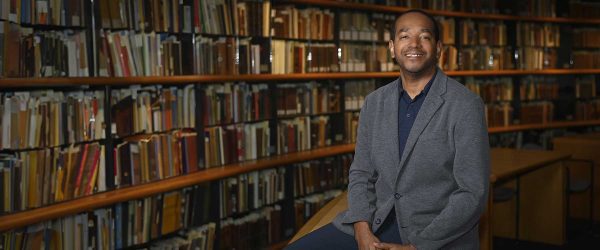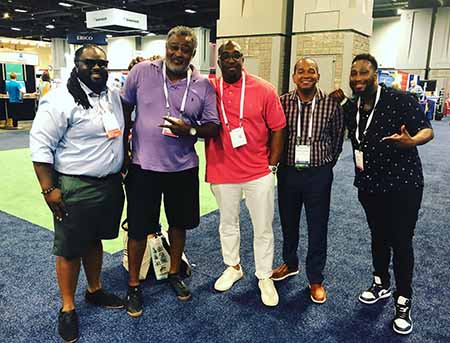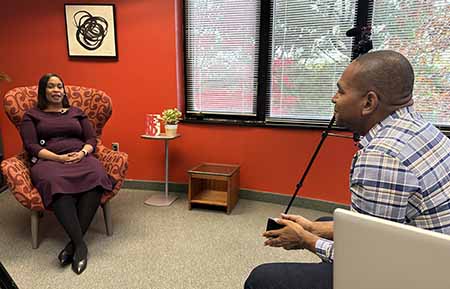The power of knowledge and information: Charlotte’s Rodney Freeman is chronicling the history of Black librarians

Digital production librarian Rodney Freeman Jr. spends the workday archiving photos, films, documents and other materials that are within the collections of UNC Charlotte’s Atkins Library. In his free time, he is pursuing a passion project — a documentary focused on Black librarianship.
“My goal is to tell the story of Black librarians and show how their contributions have shaped the profession,” said Freeman. “Black history is American history, and representation matters.”
Titled “Are You a Librarian: The Untold Story of Black Librarians,” Freeman’s documentary is underway; the goal — its premiere at the 2025 American Library Association Conference in Philadelphia. He is financing the project via a GoFundMe campaign. And he has built a team to bring the film to fruition: Zuri Davenport, a writer and former public librarian; Asia Harris, an independent filmmaker and youth programs manager at the National Underground Railroad Freedom Center; and Atkins Library colleagues Adreonna Bennett, community engagement archivist; Angel Truesdale, associate professor and social sciences and business librarian; and communications specialist Byron Williams who is serving as the documentary’s videographer.
Prior to joining UNC Charlotte in August 2022, Freeman was a library director in Riviera Beach, Florida. Well-versed in digitizing films, photos and documents to enable public access, Freeman had little experience as a documentary filmmaker.
“A couple of years ago, my parents asked me to complete a project for which I scanned 10,000 photos, and I had CDs, DVDs, VHS tapes converted to flash drives. I ended up combining various elements to tell my family’s story,” said Freeman, who completed a Master of Library Science from Indiana University–Purdue University Indianapolis. He also has a Master of Public Administration and a bachelor’s degree from Indiana University.
Are you a librarian?
 The question “Are you a librarian?” is one Freeman has been asked frequently throughout his career. Less than 10 percent of librarians are Black, according to U.S. Department of Labor statistics, and Freeman noted this lack of representation led to some disillusionment about the profession.
The question “Are you a librarian?” is one Freeman has been asked frequently throughout his career. Less than 10 percent of librarians are Black, according to U.S. Department of Labor statistics, and Freeman noted this lack of representation led to some disillusionment about the profession.
A chance encounter at a national conference for the American Library Association had a profound effect; it reinvigorated his desire to contribute new information to society’s body of knowledge.
“I met several Black male librarians, and I listened as they told their stories and watched as they interacted with others. They recounted how they faced discrimination and other challenges, but they also shared career high points,” said Freeman. “I thought, ‘Who is going to document this history?’ I wasn’t aware of anyone else, so I decided to tackle it.”
Drawing inspiration from an early experience
After completing an MPA, Freeman worked in Kankakee, Illinois, as a library page. Kankakee’s library was diverse and fostered a tight-knit family atmosphere, and the director encouraged Freeman to pursue the profession.
He recalled library personnel gathering a group of World War II veterans to record oral histories of their service.
“The director had them bring in photos and artifacts, and he captured all their contributions and created a PBS documentary,” Freeman said. “I was fascinated because he was producing new information that previously was unavailable.”
Subsequent jobs, however, did not enable Freeman to capitalize on that experience. In other workplaces, he encountered racial animus from colleagues and patrons, most often through microaggressions, those intentional or unintentional slights, directed toward him.
As part of his documentary research, Freeman interviewed Black librarians across the spectrum, from those who worked in public schools and libraries to college and university settings and even a presidential library. Their stories mirrored experiences Freeman encountered.
Unearthing the history of Black librarianship
To date, Freeman has conducted 30 virtual interviews and 32 on-camera interviews. An early one featured Meredith Evans, director of the Jimmy Carter Presidential Library and Museum and the former associate dean for Atkins Library Special Collections.
“There were Black librarians in the late 1800s,” Evans explains in a documentary clip. “We had school librarians, and we had libraries in people’s homes, because we had to educate our own.”
During graduate studies, Freeman learned about segregated libraries, and how “one day, they magically were integrated.” However, as many interview subjects noted, this did not lead to immediate improvements in library access for Black citizens.
 It has taken decades of Black librarianship to alter how the libraries have become more engaged in the community. In the early 1900s, Arthur Alfonso Schomburg, namesake of the New York Public Library’s Schomburg Center for Research in Black Culture, and others created their own libraries, which they made available for Black communities. Secret literacy organizations were formed to teach freed slaves to read. Future Supreme Court justice Thurgood Marshall, early in his career, filed suit to integrate a library, and Martin Luther King Jr. advocated for desegregated public libraries because while Black people paid taxes to support local libraries, they couldn’t use them.
It has taken decades of Black librarianship to alter how the libraries have become more engaged in the community. In the early 1900s, Arthur Alfonso Schomburg, namesake of the New York Public Library’s Schomburg Center for Research in Black Culture, and others created their own libraries, which they made available for Black communities. Secret literacy organizations were formed to teach freed slaves to read. Future Supreme Court justice Thurgood Marshall, early in his career, filed suit to integrate a library, and Martin Luther King Jr. advocated for desegregated public libraries because while Black people paid taxes to support local libraries, they couldn’t use them.
“The story of Black librarianship is about resilience. But, it also speaks to what is happening today with renewed calls to limit access to information via book bans around gender expression. Because of what Black librarians experienced historically, we don’t want to suppress anybody’s narrative, because we know that knowledge and information are power.”
Photos, inset, Rodney Freeman was inspired to document Black librarianship after meeting this group of librarians at an ALA conference, and Freeman interviews Sonia Alcántara-Antoine the first person of color to serve as CEO of Baltimore County Public Library.